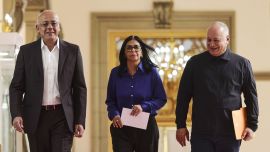After months of intense debate and campaigning that divided the country, Argentina’s Senate this week rejected a bill to legalise elective abortion up until the 14th week of pregnancy.
The issue of abortion – traditionally a taboo subject in Argentina that went undiscussed in the public sphere – exploded onto the national dialogue this year when President Mauricio Macri used his state-of-the-nation address to announce his government would send legislation to Congress on the issue.
The pro-choice camp has been buoyed by the feminist movement and NGOs, such as Amnesty International and the National Campaign for the Right to a Safe, Legal, and Free Abortion, which have for years campaigned for legal access to the procedure. Amnesty International has played an active role in the abortion debate: the international civil rights watchdog published multiple in-depth reports and campaigned to raise awareness both nationally and worldwide, including a full-page advertisement in The New York Times this week which reminded legislators that “the world is watching.
After a long, cold night in front of Congress, and amid whirlwind of press conferences and requests, Amnesty’s Coordinator of Human Rights and Youth Education Lucila Galkin talked to the Times about the “no” vote and the future of the fight to legalise abortion.
What is Amnesty reaction to the vote and what consequences will it have?
As an organisation we believe that the senators wasted an historic opportunity in rejecting the bill and we believe that it’s a way of perpetuating the cycle of violence against women and others who can become pregnant But more than anything, we think this is redeemed by what happened on the streets last night, which were filled with women and especially young people that were there despite the inclement weather.
We are hopeful that sooner or later [legal abortion] will become a reality and we believe that this is a battle that has already been won on the streets — it’s reached schools and family tables — and many of the women and children that felt disappointed with last night’s decision are voters.
Why do you think the bill failed?
There is still very big pressure from conservative sectors and the presence of the Church. Amnesty International carried out a poll this year in which 63 percent of those surveyed did not want the Church to be involved or be a determining factor when it came to making decisions about women’s bodies. I think that’s one of the hardest factors to address.
Senate representatives have a different mindset right now to the people on the streets, the women and the youth, but eventually the two will be aligned.
There also needs to be a more in-depth effort to raise awareness in the provinces, where conservative sectors often carry even more weight. We saw this through the threats made against senators who were doubting their vote, as well as the violence and persecution of young people that showed themselves to be in favour of voluntary terminations.
There’s still a lot to be done in order to truly respect freedom of expression … the debate in Congress was plural, democratic and transparent but there was a lot of violence in the background that played a large role in the result.
The abortion debate has been put on hold now until the beginning of the next legislative year, in 2019. Are there other related projects that are being worked on by Amnesty in the meantime?
We will be debating the Criminal Code reform in the upcoming weeks, in which Article 86 is included and where the three cases in which abortion is legal are established. That might become an axis to continue working on, at least to push the decriminalisation through, but until now we’ve been focusing efforts on Congress and legalisation so we have to regroup and continue with new strategies to make this law a reality.
After the ‘no’ vote, what happens with the fight to legalise abortion? What role will Amnesty International and other NGOs play?
Amnesty has been working on this for years after launching “My Body, My Rights” campaign [in 2014.] These campaigns are biannual but in Latin America, sexual and reproductive rights have been designated as priority objectives until at least 2020 and override the international campaigns because of the worrying numbers of maternal deaths due to clandestine abortions and the high rate of unplanned teenage pregnancies.
So for a start, we’ll continue with that campaign, with our efforts in human rights education in formal and informal education spaces in order to give the youth tools to know their rights and demand them. There will be more campaigns, more political science and more litigation: there are many ways in which we will channel our efforts. The vote was a setback but sooner or later we will prevail.
Amnesty International placed a full-page advertisement in The New York Times this week supporting the fight for legalisation. How important is international scrutiny?
We chose The New York Times because it’s an international newspaper published in over 130 countries and we believe that the Argentine political class in general care about how we are viewed from abroad, so we thought that it was a good strategy to let them know that the world is watching.
The countries that Argentina recognises as developed and seeks to emulate, such as the member states of the Organisation for Economic Cooperation and Development (OECD), have legalised abortions. This is not a minor detail: Argentina has been told by international organisations to review its stance on abortion and wants to be part of the OECD, so it should fully recognise the rights of its citizens. We understand that international organisations will continue to raise awareness until the State adapts its norms and we will continue to accompany that drive until Argentina is up to par with international standards of human rights.
After the past few months, do you believe that the fight for legalising abortion has entered a new phase?
I am convinced that we have entered a new phase. The movement is now organised in a new, different way with new tools, strengthened by youth participation and without a doubt we are doing much better. Until today, the issue of abortion had been taboo, restricted to private spaces and it was difficult to get it in the public sphere: it’s now on the streets and there is no going back.
Do you agree with the media’s portrayal of an absolute divide between blue and green? Do you think that it can be bridged somehow?
The media always focuses a lot on the divisions or the “grieta,” but I think that the debate on women’s rights transcended the political divide and, for the first time, crossed party lines with youth movements of different stripes asking their representatives to change their position because they no longer felt represented by them.
Do you think the government should be held accountable when it comes to gender equality and reproductive rights after this vote?
Yes. Argentina still has many debts to pay when it comes to equal rights, without a doubt. Amnesty has been leading a campaign to improve sexual education because it’s not only about STDs or family planning, it’s also about deconstructing gender roles. There is essential work to be done there. This government will have to be held accountable in many ways and continue to move forward.
Do you think Argentina will legalise abortion? Can you predict when or how it will happen?
I like the question because I am convinced that Argentina will legalise abortion. The hardest part is saying “when.” Next year is an election year, which is key: it would be premature to talk about what strategies will be implemented but if it isn’t next year, because Congress will have the same representatives, it’ll be the next when the seats are renewed.
This is a journey: we may have lost a battle yesterday but the fight has already been won in the streets and will soon be reflected in our legal rights.


























Comments